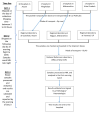Maternal and perinatal Health Research Collaboration, India (MaatHRI): methodology for establishing a hospital-based research platform in a low and middle income country setting
- PMID: 33500775
- PMCID: PMC7812614
- DOI: 10.12688/f1000research.24923.3
Maternal and perinatal Health Research Collaboration, India (MaatHRI): methodology for establishing a hospital-based research platform in a low and middle income country setting
Abstract
Background: Maternal and perinatal Health Research collaboration, India (MaatHRI) is a research platform that aims to improve evidence-based pregnancy care and outcomes for mothers and babies in India, a country with the second highest burden of maternal and perinatal deaths. The objective of this paper is to describe the methods used to establish and standardise the platform and the results of the process. Methods: MaatHRI is a hospital-based collaborative research platform. It is adapted from the UK Obstetric Surveillance System (UKOSS) and built on a pilot model (IndOSS-Assam), which has been extensively standardised using the following methods: (i) establishing a network of hospitals; (ii) setting up a secure system for data collection, storage and transfer; (iii) developing a standardised laboratory infrastructure; and (iv) developing and implementing regulatory systems. Results: MaatHRI was established in September 2018. Fourteen hospitals participate across four states in India - Assam, Meghalaya, Uttar Pradesh and Maharashtra. The research team includes 20 nurses, a project manager, 16 obstetricians, two pathologists, a public health specialist, a general physician and a paediatrician. MaatHRI has advanced standardisation of data and laboratory parameters, real-time monitoring of data and participant safety, and secure transfer of data. Four observational epidemiological studies are presently being undertaken through the platform. MaatHRI has enabled bi-directional capacity building. It is overseen by a steering committee and a data safety and monitoring board, a process that is not normally used, but was found to be highly effective in ensuring data safety and equitable partnerships in the context of low and middle income countries (LMICs). Conclusion: MaatHRI is the first prototype of UKOSS and other similar platforms in a LMIC setting. The model is built on existing methods but applies new standardisation processes to develop a collaborative research platform that can be replicated in other LMICs.
Keywords: India; Research platform; epidemiology; low-and-middle income country; maternal health; perinatal health; research model.
Copyright: © 2021 Nair M et al.
Conflict of interest statement
No competing interests were disclosed.
Figures



References
-
- World Health Organization: The World health report : 2005 : make every mother and child count. Geneva: World Health Organization,2005. Reference Source
-
- WHO, UNICEF, UNFPA, et al.: Maternal mortality: Levels and trends 2000 to 2017. Geneva: World Health Organisation,2019. Reference Source
-
- Office of Registrar General and Census Commissioner India: Annual Health Survey 2012-13: Fact sheet. New Delhi: Ministry of Home Affairs, Government of India,2014. Reference Source
-
- Knight M, Bunch K, Tuffnell D, et al. : Saving Lives, Improving Mothers’ Care - Lessons learned to inform maternity care from the UK and Ireland Confidential Enquiries into Maternal Deaths and Morbidity 2015-17. Oxford: National Perinatal Epidemiology Unit, University of Oxford,2019. Reference Source
Publication types
MeSH terms
Grants and funding
LinkOut - more resources
Full Text Sources
Other Literature Sources
Medical

